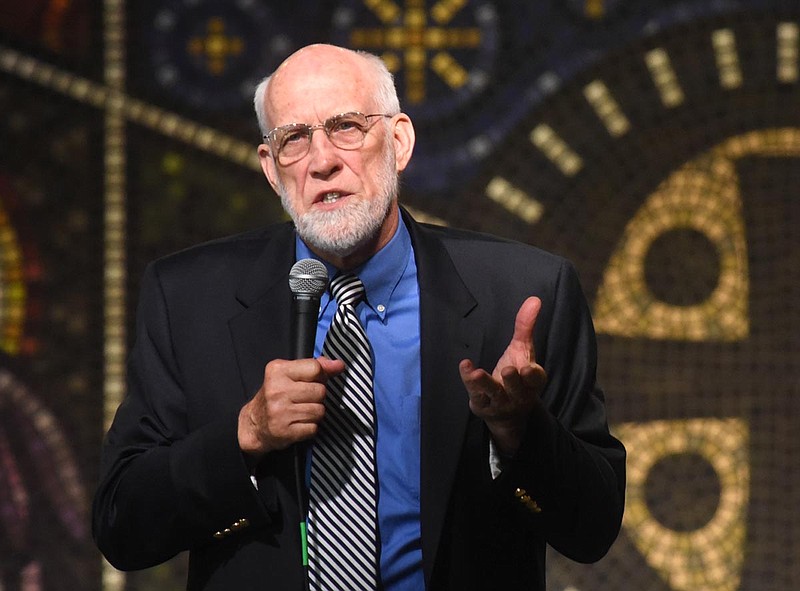The Franklin McCallie gospel might be spreading.
In the aftermath of Trayvon Martin and Mike Brown and Eric Garner and Dylann Roof and Rachel Dolezal, race relations have burst anew into the national conscious.
Many have called for policy change, for reforms to bureaucracy, for new laws. Civilian review panels for police complaints. Reforms of the court system. Cultural sensitivity training for law enforcement. The removal of the Confederate flag from state buildings. A renewed focus on the inequity that exists between blacks and whites in education and earnings.
But amidst the headlines and the social media fervor, McCallie, a 75-year-old retired St. Louis educator and the scion of one of Chattanooga's most prominent families, has been working on more of an informal solution to the growing racial divide in cities across America.
The idea, simply put, is friendship. The concept - which is backed by research -is that hatred, misunderstanding and anger are no match against a real relationship between two people who can recognize that they have more in common than they know.
Last fall, the Times Free Press wrote about McCallie's novel approach, which started when he, his wife Tresa and Eleanor and Mel Cooper decided to host a social gathering at the McCallie home. They intentially invited a mix of black and white professionals and wove conversations about race into the evening as a way to diffuse awkwardness and build trust between strangers.
And it worked. The friendships stuck. People kept coming back. New people were invited. Sometimes the crowd got too big to fit into the McCallies' living room.
"We are in a time in the U.S. where it is evident that relationships between the community need to be improved and that is especially true for police," said Nathan Vaughn, a Chattanooga police officer who has become friends with McCallie and been involved with his efforts. "That lack of positive relationships, that lack of trust has led to some significant issues."
Many, black and white, have said they were captured by McCallie's refreshing openness.
He speaks frankly, not only about his passion for reconciliation between blacks and whites and about addressing the persistent racial segregation in cities like Chattanooga, but also about his racist past and the culture he came from.
"It's a Southern boy who grew up with racism around him and grew up and realized it and was honest about it," said McCallie. "Blacks who share with me say I have never heard a white man be honest about racism."
In October, McCallie and the leadership team that helps organize the interracial dessert conversations gave their group a name - Chattanooga Connected - and started a Facebook page, which was liked and seen by thousands in the first few weeks. McCallie said many people just showed up at his front door to ask how they could get involved.
"It's become the microcosm of the macrocosm that we want to see," he said.
Others have decided to start their own interracial dessert conversations. Curtis and Susie Baggett, who were part of the initial group at the McCallies' home, have held two meetings in Ooltewah. Sue Reynolds, Judith Benn-Peterson and Dollie Hamilton started meetings in the East Brainerd area. And another group of young women, half black and half white, have been meeting for lunch.
Now the idea is taking root beyond the Scenic City.
"The reason I am excited is that I think what we are doing here could be so easily replicated in other cities and that, to me, is exciting," said Judy Schwartz, a community volunteer who is working with McCallie. "What we are doing is simple but very profound."
McCallie has been contacted by groups in St. Louis, Memphis and Athens, Ga., and individuals from across the country have found his contact information and reached out, either to tell him thank you or ask how they could get involved.
A few days ago, CBS News approached McCallie and his group about doing a segment on his work, which is set to air on the national nightly news on Thursday, July 23. CBS will film a meeting of the leadership team that organizes the interracial dessert conversations the night before the segment airs.
And McCallie and all his friends and family who have worked to build momentum for this small revolution are thrilled to be on a national stage.
"We do understand that two hours of interviews often are condensed to a 30 second to 2 minute piece, but we are gratified that CBS is interested in how this group of Chattanoogans is taking positive steps toward interracial friendship and understanding," he wrote in an email this week.
Still, there is much work to be done, he said.
"There are many that say, 'Right on, brother!'" he said. "There are other white people who don't want to hear that. They aren't ready to take down the Confederate flag. They aren't ready to accept white privilege."
"'It is not as bad as you say it is,' they say.' I tell them, 'I am not aggregating about how it was or how it is.'"
Contact staff writer Joan Garrett McClane at 423-757-6601.
